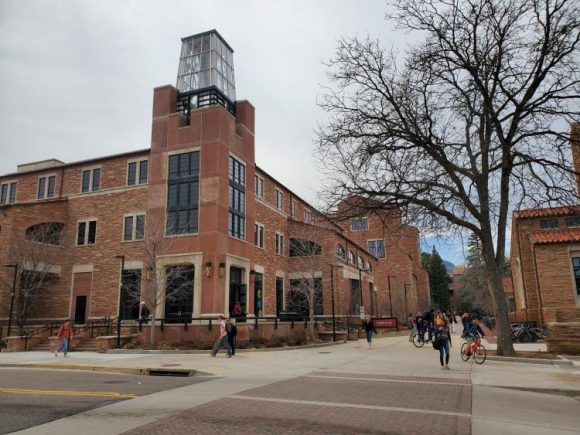
The Roser ATLAS building at CU Boulder. (Photo courtesy of the University of Colorado Boulder)
Callisto, a project that aims to empower survivors and hold perpetrators of sexual violence accountable, launched for college students across the nation, including at the University of Colorado Boulder, on Oct. 16. The project uses matching algorithms to connect survivors of sexual violence and provide resources for reporting purposes.
The project offers an incident log and a confidential matching service. Students can access both with a valid .edu email.
The incident log functions as a confidential notebook for survivors to document assault details and timestamps to make reporting easier. It’s also intended to reduce concerns that survivors may have about the reporting process of an assault, such as facing blame themselves.
“If you do it immediately and some of the questions are, ‘Why didn’t you say anything to anyone?’ you can be like, ‘Actually, I wrote it down right that night,’” said Ray Epstein, the founder and president of Student Activists Against Sexual Assault at Temple University. The campus received early access to the Callisto Project on July 26. “So the idea is to get this out there so that you can really prevent all of these victim-blaming things from coming up later.”
Callisto also offers a confidential matching service that allows survivors to determine if the same perpetrator has assaulted others.
Users input information about their assault and perpetrator, such as the campus where it occurred and any unique identifiers like social media handles. If the system identifies a match, the survivors will receive free legal options and counseling. If all parties agree, the survivors can be connected.
“We can’t see the survivor’s information out there,” project representative Sarayfah Bolling said. “We designed the system in that way just to allow for the survivor to maintain complete control over what does or doesn’t happen with their information.”
Callisto is partially founded on the statistic that more than 90% of assaults during a student’s college years are committed by repeat perpetrators and that these perpetrators commit an average of six assaults before graduation, according to their mission statement.
However, this statistic comes from a much-scrutinized study by clinical psychologist David Lisak, whose work has been called into question for not focusing on college students and campuses.
“I’m not super confident that some of those claims are based on actual data,” said Teresa Roe, a deputy Title IX coordinator in the Office of Institutional Equity and Compliance at CU Boulder. “It’s one challenging area because sexual assault is a grossly underreported problem.”
Bolling noted these challenges regarding the collection of accurate data as it relates to sexual violence.
“We are aware of the challenges related to Lisak’s research work and want to be clear that despite these challenges, what holds true is that serial offenders account for the vast majority of sexual assaults that are committed,” said Bolling in a written statement to the CU Independent.
For some students, the benefits of the program outweigh potential doubts about the data behind its founding.
“I think that this program might have flaws,” said Anna Adams, a freshman board member of Students Against Campus Sexual Assault at CU Boulder. “But I think that it would have the potential to connect to people and to offer a sense of community in a time where people feel like they’re really uncomfortable in their own lives because of something extreme that happened to them.”
In September 2022, CU Boulder released its most recent Sexual Misconduct Survey, which found a decrease in the number of instances of sexual assault reported but an increase in the severity of assaults for 2021.
“Because it’s such a problematic area in terms of reporting, more resources can be really beneficial to people having a sense of what their various options are,” Roe said.
Students can also report instances of assault directly to OIEC, the Boulder Police Department or reach out to the Office of Victim Assistance for more support and resources.
Callisto, as well as CU Boulder resources, all aim to keep college students safe from sexual violence and to provide resources for coping and reporting.
“I really feel like we’re all in this together, and so many more voices together are so much stronger,” Epstein said. “We fight in isolation, and it makes every single movement so much less powerful than it could be because we have this technology, and we’re all connected.”
Contact CU Independent News Editor Jessi Sachs at Jessica.Sachs@colorado.edu.
